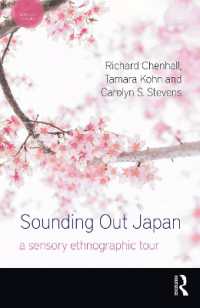- ホーム
- > 洋書
- > 英文書
- > Politics / International Relations
基本説明
Based on archival material from four states, interviews and correspondence with diplomats, and a wide ranji of secondary sources, the result is a fascinationg, multidisciplinary exploration of the evolving Commonwealth and the way in which its 53 members and Ireland conduct diplomacy with one another.
Full Description
This book illuminates two familiar phenomena - diplomacy and the Commonwealth - from a new and unfamiliar angle: the atypical way in which the Commonwealth's members came to, and continue to, engage in official relations with each other. This innovative and wide-ranging study is based on archival material from four states, interviews and correspondence with diplomats, and a wide range of secondary sources. It shows how members of an empire found it necessary to engage in diplomacy and, in so doing, created a singular, and often remarkably intimate, diplomatic system. The result is a fascinating, multidisciplinary exploration of the evolving Commonwealth and the way in which its 53 members and Ireland conduct diplomacy with one another, and in so doing have contributed a distinctive terminology to the diplomatic lexicon.
Contents
The office of high commissioner
High commissioners and diplomacy
Chapter 1 - Beginnings, 1880-1914
§ Colonial representation in London
§ The emergence of the office of high commissioner
§ Early high commissioners and the establishment of the office
Chapter 2 - Consolidation: 1914 - late 1930s
§ The growing stature of the dominions: their entry into international relations and the question of constitutional change
§ The enhanced standing of high commissioners in London
§ The importance of the office
§ An expanding work load
§ The growing diplomatic character of the office
§ Winning enhanced status
§ Consultation, information gathering, and high commissioners' meetings
§ Limitations on high commissioners as diplomats
§ Problems with prime ministers
§ Other channels of communication
§ Prime minister to prime minister
§ Government-to-government
§ Liaison officers
§ The decline of the office of governor-general and the emergence of British high commissioners
§ South African and Irish overtures to Canada, and the despatch of a South African 'Accredited Representative'
Chapter 3 - Discontent, late 1930s - mid-1940s
§ High commissioners and high commissioners' meetings during the Second World War
§ The expansion of high commissions
§ Anglo-Irish complications
§ High commissioner woes: Canada and South Africa
§ The standing of high commissioners elsewhere
§ Post-War developments
§ Ireland and Australia: 'an Ambassador, or a Minister or a What'?
§ Moving forwards: Ireland and Canada
§ Deputy high commissioners
Chapter 4 - Equal Status, 1946-1948
§ Discussions in Ottawa
§ Dominion views of the office
§ Britain's deliberations
§ The Prime Ministers' Meeting, 11-22 October 1948
§ Implementing the Prime Ministers' decisions
Chapter 5 - Substantive equality, late 1940s - early 1950s
§ Keeping India in the Commonwealth
§ High commissioners to and from India, Pakistan, and Ceylon
§ India and the question of translating high commissioners into ambassadors
§ Accreditation and agréation
§ The diplomatic consequences of Ireland's departure from the Commonwealth
§ Later problems
§ Diplomatic immunity
§ High commissioners and the décanat
§ Further equality
§ South Africa and the décanat, 1956
Chapter 6 - 'Ambassadors plus', early 1950s - mid-1960s
§ Pageantry and protocol
§ Royal occasions
§ Presentation of Credentials
§ The activity of high commissioners
§ Relations with the receiving state
§ The influence of British high commissions
§ Collegial relations
§ The Commonwealth Relations Office
§ CRO diplomacy
§ Information sharing
§ Ireland and the CRO
§ Safeguarding the office: the 1961 Vienna Convention on Diplomatic Relations
§ Preparation
§ The Conference, 2 March-18 April 1961
§ Impact
Chapter 7 - Normalisation, early 1960s - mid-1970s
§ Consular relations
§ The Commonwealth's consular arrangements
§ The 1963 Vienna Convention on Consular Relations (VCCR)
§ Preparation
§ The Conference
§ From the Vienna Conference to consular relations
§ Comings - and goings
§ South Africa
§ Pakistan
§ The Commonwealth Secretariat
§ Meetings of high commissioners and of Commonwealth heads of mission
§ The position of high commissioners
§ Titular flexibility - and orthodoxy
§ CRO diplomacy and the demise of the CRO
§ Britain and the décanat
§ British high commissioners and the décanat in newly-independent states
§ The doyen in London
§ Australian sniping
Chapter 8 - Survival: mid-1970s - 2006
§ The position of high commissioners
§ Information sharing and collective meetings
§ Relations between individual high commissioners
§ High commissioners and the receiving state
§ The office and the Commonwealth
§ Unexpected applicants - and lost sheep
§ Return of the prodigal
§ The question of Ireland
§ A Commonwealth constituency
§ The Queen as Head of the Commonwealth







